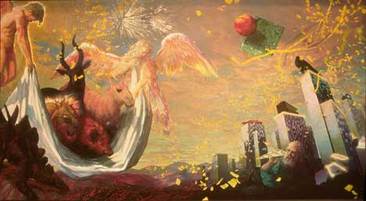
We're great at labels, division, and exclusion, but lousy at the things Jesus was about like reconciliation, peacemaking, and inclusion. The earliest church struggled, too, but Jesus reminds all disciples of the priority.
We need to remember that the people of faith in Jesus as Messiah - the Jesus people - were regarded for decades after the crucifixion and resurrection as a Jewish sect. That meant keeping all the Jewish laws and codes as well as worshiping at the Temple and synagogues, keeping the holidays, and maintaining separation from profane things that would make one unrighteous or sinful before God. Eating only the right foods and staying away from wrong foods, and eating with fellow Jews and staying away from Gentiles (non-Jews) was fully expected and practiced by the earliest Jesus people. And baptism? Well, what do you think?
Cracks in that strict adherence to the Torah-Law had already begun during Jesus' ministry, and his departure left the church to figure it out going forward. It wasn't easy, just like it wasn't easy to dismantle Jim Crow segregation or integrate public schools from Little Rock to Boston. It isn't easy now with the transgender issue in the local public schools. Departing from longstanding custom and tradition to envision something new is invariably loaded with conflict.
The passage from Acts 11 is the last section of a story that took all of chapter 10 to tell. Chapter 10 details the experience of Peter and his vision (painting above by Doug Jacques), a centurion in the imperial capital of Caesarea and his vision, the bringing of them together, and a bunch of boundaries crossed and customary restrictions violated. What a mess!
In Acts 11, Peter brings news of what happened at Caesarea to his apostolic colleagues in Jerusalem. He is met with resistance - surprise, surprise! But he wins them over.
In the process, it seems Peter has recalled Jesus' teaching and discovered its meaning in new ways in light of being a resurrection witness. As it comes to us in John 13, Jesus commands "love one another."
This love ideally is the love of a family for its members. Jesus' vision of the Kingdom is that all people in God's creation regard themselves as sisters and brothers, as members together in the same family of God's promise.
It's a great story that you can check out in full with the sermon video below, and with the downloads below the video panel.
We need to remember that the people of faith in Jesus as Messiah - the Jesus people - were regarded for decades after the crucifixion and resurrection as a Jewish sect. That meant keeping all the Jewish laws and codes as well as worshiping at the Temple and synagogues, keeping the holidays, and maintaining separation from profane things that would make one unrighteous or sinful before God. Eating only the right foods and staying away from wrong foods, and eating with fellow Jews and staying away from Gentiles (non-Jews) was fully expected and practiced by the earliest Jesus people. And baptism? Well, what do you think?
Cracks in that strict adherence to the Torah-Law had already begun during Jesus' ministry, and his departure left the church to figure it out going forward. It wasn't easy, just like it wasn't easy to dismantle Jim Crow segregation or integrate public schools from Little Rock to Boston. It isn't easy now with the transgender issue in the local public schools. Departing from longstanding custom and tradition to envision something new is invariably loaded with conflict.
The passage from Acts 11 is the last section of a story that took all of chapter 10 to tell. Chapter 10 details the experience of Peter and his vision (painting above by Doug Jacques), a centurion in the imperial capital of Caesarea and his vision, the bringing of them together, and a bunch of boundaries crossed and customary restrictions violated. What a mess!
In Acts 11, Peter brings news of what happened at Caesarea to his apostolic colleagues in Jerusalem. He is met with resistance - surprise, surprise! But he wins them over.
In the process, it seems Peter has recalled Jesus' teaching and discovered its meaning in new ways in light of being a resurrection witness. As it comes to us in John 13, Jesus commands "love one another."
This love ideally is the love of a family for its members. Jesus' vision of the Kingdom is that all people in God's creation regard themselves as sisters and brothers, as members together in the same family of God's promise.
It's a great story that you can check out in full with the sermon video below, and with the downloads below the video panel.
| 04-24-16-ff-answers.pdf |
| 04-24-16-resurrection_witness-loving_family.pdf |
